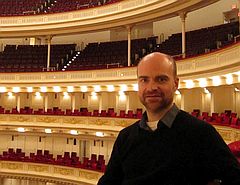Wizualizacja spuścizny kulturowej: otwarte Linked Data w Carnegie Hall cz. 1

Przedstawiamy gościnny blog Roberta Hudsona, archiwisty z Carnegie Hall w Nowym Jorku. Rob jest z wykształcenia muzykiem, zainteresowany archiwami, pracuje w Carnegie Hall od 1977 roku. Odkrywszy bazę danych występów w Carnegie Hall sięgających 19 wieku, Rob postanowił nauczyc sie programowania i dokonać konwersji danych w postać otwartego Linked Data tak, aby można było odkrywać powiązania i informacje o kompozytorach, wykonawcach i koncertach. Wielu polskich twórców i wykonawców przez lata brało udział w przedstawieniach w Carnegie Hall. Inicjatywa Roba przyczyni się, miejmy nadzieję, do udostępnienia ciekawego rozdziału z historii muzyki również polskim fanom.
Part I: Process
My name is Rob Hudson, and I’m the Associate Archivist at Carnegie Hall, where I’ve had the privilege to work since 1997. I’d like to tell you about my experience transforming Carnegie Hall’s historical performance history data into Linked Open Data, and how within the space of about two years I went from someone with a budding interest in linked data, but no clue how to actually create it, to having an actual working prototype.
First, one thing you should know about me: I’m not a developer or computer scientist. (For any developers and/or computer scientists out there reading this right now: skip to the next paragraph, and try to humor me.) I’m a musician who stumbled into the world of archives by chance, armed with subject knowledge and a love of history. I later went back and got my degree in library science, which was an incredibly valuable experience, and which introduced me to the concept of Linked Open Data (LOD), but up until relatively recently, the only lines of programming code I’d ever written was a “Hello, World!” – type script in Basic — in 1983. I mention this in order to give some hope to others out there like me, who discovered LOD, thought “Wow, this is fantastic — how can I do this?”, and were told “learn Python.” Well, I did, and if I can do it, so can you — it’s not that hard. Much harder than learning Python — and, one might argue, more important — is the much more abstract process of understanding your data, and figuring out how to describe it. Once you’ve dealt with that, the transformation via Python is just process — perhaps not a cakewalk, but nonetheless a methodical, straightforward process that you can learn and tackle, step by step.
Czytaj dalej „Visualizing Cultural Heritage: Linked Open Data and the Carnegie Hall Archives p. 1”

